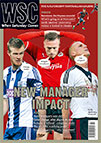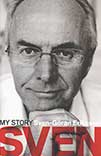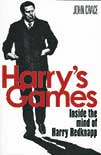Search: 'Roy Hodgson'
Stories
 England face Costa Rica at the 2014 World Cup but they won’t be the first of the home nations to do so and would be wise to heed their neighbour’s traumatic experience, writes Archie MacGregor
England face Costa Rica at the 2014 World Cup but they won’t be the first of the home nations to do so and would be wise to heed their neighbour’s traumatic experience, writes Archie MacGregor
Costa Rica were not supposed to be an accident waiting to happen for Scotland at the 1990 World Cup finals. After the hubris and humiliation of Argentina 78 followers of the national team had a dozen years of intensive therapy about where we stood in the global order. Never again would we take anything for granted at a major tournament.
 by Sven-Göran Eriksson
by Sven-Göran Eriksson
Headline, £20
Reviewed by Barney Ronay
From WSC 323 January 2014
When it comes to blockbusting autumn autobiographies this was always destined to be the Other One. Ah, Sven. Is there a more glazed, jaded and – here at least – unexpectedly fascinating major player in English football’s most recent decade of plenty? Sven-Göran Eriksson may not have Alex Ferguson’s trophy haul, planetary-scale publisher’s advance or enduring sense of heft. He may have spent the last five seasons in retreat from the years of Peak Sven, when he seemed permanently ensconced among the sober suited managerial elite, catnip to the billionaire, darling of the tabloids, golden-handshaked by assorted FAs and fossil-fuel newbie-powers.
He may have emerged at the end of it all, at least judging by Sven: My Story, as an oddly chastened and soulful one-time master of the universe, assailed not just by law suits and malevolent ex-girlfriends but by doubts, fears and regrets. But he definitely has the more interesting book, and by some distance too. In fact My Story is a genuine treat from its oddly fractured opening pages, all present tense and angsty, existential regret – “it is early December and the first snow has just arrived” – the football manager’s autobiography as reimagined by Bret Easton Ellis.
As early as page six we find Sven being swindled out of his fortune by a financial adviser and dismissing Nancy Dell’Olio with “We met in Rome during my time at Lazio. She was irresistible, then”. This is the familiar softly spoken, equivocal Sven, but fretted now with melancholy and producing after some delicately sketched lines on his childhood (“I was born into secrecy”) one of the more memorable football books of recent years.
There is a brilliant, and at times rather forgotten, managerial story in here: from the rise to precocious success at IFK Gothenburg, to glory in Portugal and Italy, to the initially giddy England years. There are plenty of laughs, many of them unintentional (as a young man Sven wrote a doctoral thesis on the 4-4-2 formation, and its unbending application in all circumstances). And there is footballing insight too, from the “revolution against individualism” of Sweden’s tactical awakening in the 1970s (sped by the young Roy Hodgson), through Sven’s dealings with Boniek, Baggio, Beckham and the rest.
Plus there is of course lots of sex. Before long we’re hearing about Sven’s first girlfriend whose father “ran a support group for people who had been caught shooting moose illegally”. Later indiscretions include the occasion Sven was discovered reclining nude on the sofa of a cuckolded husband and ended up walking home through the streets of Stockholm without his trousers, through the familiar tabloid narrative of Nancy, Ulrika Jonsson and assorted others.
Throughout it is a strangely taut and vulnerable account, with a jarring skin of honesty. This is not so much a football book as the story of a man trapped in a series of scenes, a machinery of desire and ambition that seems at times to have overwhelmed him. Towards the end, while coaching in China, Sven describes going out for a bicycle ride on his own just after reading the proofs of My Story for the first time. “I felt depressed. Where had the years gone? My children? Friends? The women? Time? It hurt to think back.”
 Inside the mind of Harry Redknapp
Inside the mind of Harry Redknapp
by John Crace
Constable Books, £18.99
Reviewed by Jonathan O’Brien
From WSC 318 August 2013
A little over a year ago, Harry Redknapp had it all. Spurs were well on course for a Champions League place, Redknapp himself had won his courtroom battle with the taxman and he was in pole position for the England job. And if he didn’t get the latter, he had a contingency plan for the summer: a lucrative and cushy slot analysing Euro 2012 for the BBC.
Other than the tax case, none of it worked out. Spurs tumbled into the Europa League for another year, Roy Hodgson took England to Ukraine and Redknapp is out of the top flight entirely, facing a season in the Championship with a dreadful QPR team. Even the Euro 2012 gig turned sour when Redknapp sheepishly stood down from the BBC panel after Daniel Levy called his bluff over a pay rise.
Harry’s Games, a generally positive (and occasionally adoring) biography, would have seemed well timed at another moment, but parts of it read a little strangely in the summer of 2013. Redknapp sharply divides opinion among the public: some lap up his man-of-the-people clubbability, while others see him as shady and having too many fingers in pies. John Crace writes here that the aim is to find an accurate midpoint between the two extremes, though it’s obvious the author cleaves more to the former than the latter.
A Guardian journalist and Spurs fan, Crace has been dealt a slightly awkward hand, with none of Redknapp’s friends or confidantes willing to speak to him on the record. So a lot – though not all – of the book is a cuttings job, albeit a thorough and solidly written one. The problem is that he lays his cards on the table early on and keeps them there, announcing that he’s “not ashamed to love” Redknapp and talking at length about the man’s charisma and common touch. The words “national treasure” are used, and not sarcastically. You wonder exactly how much you can trust a biographer who openly admits to being in lust with his subject.
Crace’s strengths are his thoroughness and prosecraft, and Harry’s Game is an easy, diverting read if nothing else. Redknapp’s first couple of decades in football were resolutely unglamorous: his time as an injury-plagued winger for West Ham is analysed through the prism of the fear he would have felt whenever another caveman full-back was lunging in to clatter him. Retiring early, he fetched up at Bournemouth, where his first match in charge ended in a 9-0 defeat.
The West Ham years, where Redknapp seemed to be signing four players a week at one stage, were chaotic. “Harry just loved a deal,” an anonymous former West Ham board member tells Crace. “It was almost as if it were a drug.” Crace notes later that while Redknapp has a tendency to “stay in the black” when trading players, it has a bad effect on the players themselves, who don’t like being passed around like pieces of meat.
With QPR down, few expect Redknapp to hang around for long. Crace finished the book just before the relegation and rounds it off by speculating on Redknapp’s chances of pulling off another Houdini act, to cement his reputation as “one of football’s greatest ever survivors”. Perhaps, but mere survival isn’t the kind of thing that a man like Redknapp settles for.